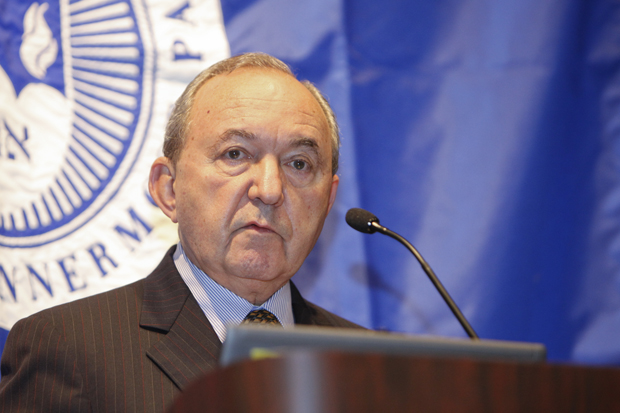'The Trials of Richard Goldstone': A Q&A with Daniel Terris
 Photo/Mike Lovett
Photo/Mike LovettRichard Goldstone speaks during an event at Brandeis in 2009.
On the 20th anniversary of the International Center for Ethics, Justice and Public Life, BrandeisNOW sat down with director Daniel Terris P’08, P’11, P’12, P’15, to discuss his forthcoming book, “The Trials of Richard Goldstone,” (Rutgers University Press, Fall 2018).
Goldstone, a South African-born judge and human-rights lawyer, has served on the Center’s International Advisory Board since its founding. He was the chief prosecutor at the United Nations’ tribunals that tried leaders of Rwanda and the former Yugoslavia for war crimes.
He also authored a controversial report on violations of international law during the 2008-09 conflict in Gaza between the Israelis and Palestinians. Two years later, Goldstone retracted a claim in the report that Israel intentionally targeted civilians as a matter of policy.
BNOW: How does your book fit into the Ethics Center’s overall mission?
Terris: The Center is very much focused on issues of human rights and international justice. We do a lot of work with international courts, trying to further their work and the work of judges who sit on those courts. Telling Goldstone’s story is a way of advancing knowledge of this whole field, introducing scholars, students and the general public to the complexities of international justice through one individual’s compelling story.
BNOW: What interested you about Goldstone?
Terris: Before the Rwanda and former Yugoslavia war crime tribunals, there was really no mechanism for holding leaders responsible for mass atrocities committed on their watch. In successfully prosecuting most of these cases, Goldstone brought about a sea change in the way the world thinks about atrocity. He also played a leading role in the transition to democracy in South Africa, setting the stage for the later Truth and Reconciliation Commission.
BNOW: How do you assess what happened with Goldstone's report on the Gaza War?
Terris: Goldstone and his fact-finding mission did an excellent job of gathering evidence and describing the impact of the conflict on civilians in both Gaza and Israel. But from the very beginning, the government of Israel did not cooperate, so the members of the fact-finding mission had to draw their analysis and conclusions based on evidence from Palestinian sources, public documents, and from a small number of unofficial Israeli sources. One big piece of the puzzle was missing. As a result, the members of the fact-finding mission had to fill in some gaps through induction and a certain amount of guesswork that made the report vulnerable to outside criticisms.
BNOW: You've known him for more than 20 years and interviewed him for more than 35 hours for the book. What's he like?
Terris: Richard Goldstone is a soft-spoken, authoritative and confident commentator on his own life and the events of his era. He is justifiably proud of the role he has played in applying international justice throughout the world. The book draws on his insights, but the analysis and the conclusions are entirely my own. It is a tribute to Goldstone’s character that he was willing to cooperate with my research, without any assurance that the end result would reflect the way that he sees himself.
Categories: Humanities and Social Sciences, Research





